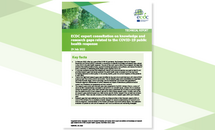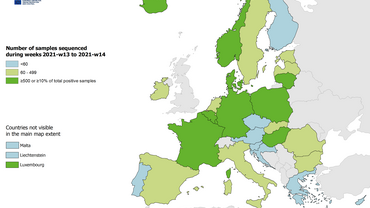ECDC expert consultation on knowledge and research gaps related to the COVID-19 public health response
Report on the ECDC expert consultation to identify knowledge and research gaps related to the COVID-19 public health response.
Executive Summary
- In February 2022, after two years of the COVID-19 pandemic, the European Centre for Disease Prevention and Control (ECDC) undertook a consultation to identify knowledge and research gaps related to the COVID-19 public health response. The aim of this work was to inform future research activities that enhance the existing evidence base, support knowledge generation and synthesis, and reduce the level of policy uncertainty in addressing public health actions against COVID-19.
- A two-step qualitative process that utilised both internal and external expertise was used to identify and prioritise research gaps that remain pertinent for public health action at present and that may have increasing relevance to inform policy in the coming months, given the current trajectory of the pandemic in early 2022.
- Twenty-two high-level research gaps were identified during semi-structured interviews with internal ECDC expert groups from various COVID-19 domains. The 22 research gaps were consolidated and organised into three thematic areas; ‘COVID-19 biology and the intersection with human host populations’, ‘Pandemic response: effectiveness of control measures and impact of behavioural, political and social context’ and ‘Pandemic (re-)emergence and new variants’.
- The research gaps under each thematic area were presented to the ECDC Advisory Forum, a group of senior EU/EEA representatives mandated to advise ECDC on scientific issues. Advisory Forum members ranked the research gaps within each thematic area using a predefined set of criteria to provide insight into the relative priority of each research gap and to inform future research action. Notably, each of the 22 research gaps received support as a high-priority area for further research from at least one Advisory Forum member. There was also consensus on the highest priority research gaps within each thematic area.
- Research gaps that were selected as one of the top three priorities in their thematic areas by 80% or more of the Advisory Forum members included: research to improve understandings of ‘immunity and immune response’, characterisation of the ‘burden of disease’ and overall clinical impact, ‘the systematic evaluation of prevention and control measures’ and ‘novel surveillance and monitoring strategies’.








